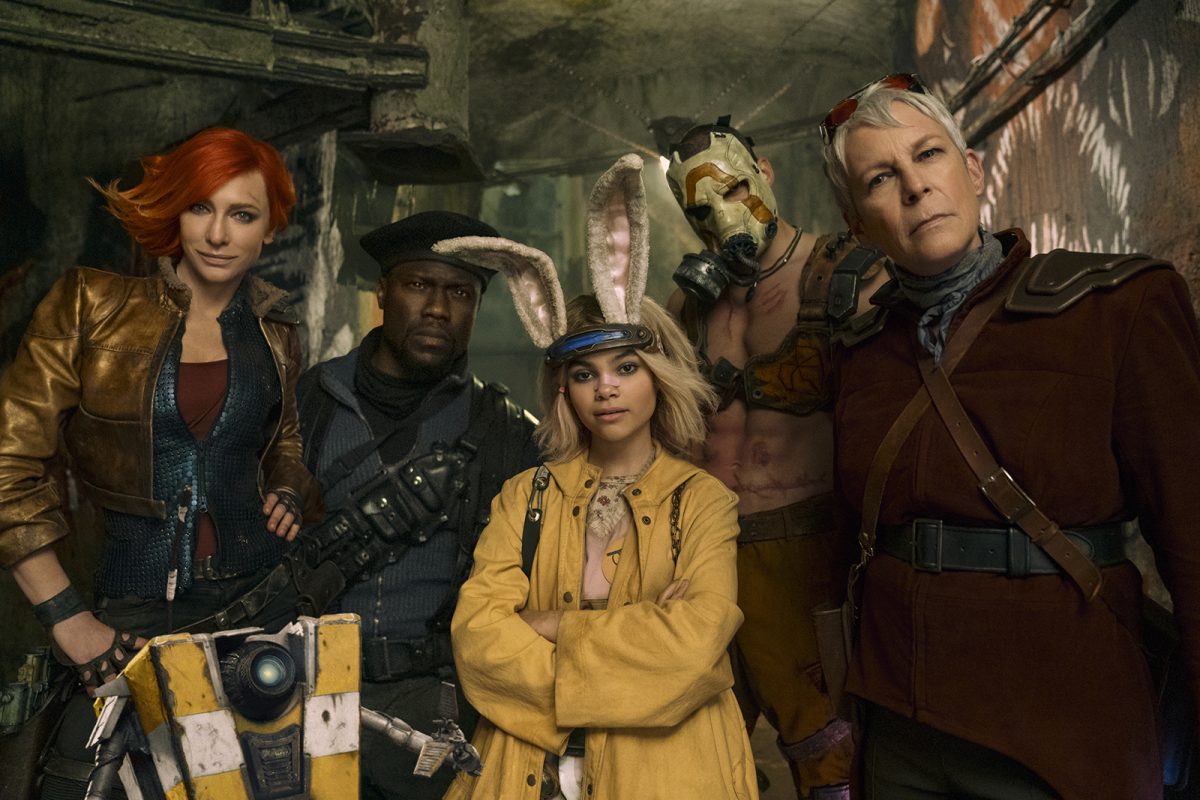With a cast of A-list actors and the weight of the popular video game series it aimed to revive on its shoulders, there was an immediate feeling of excitement surrounding the film “Borderlands.” Fans of the game had high expectations, as the Borderlands franchise is beloved for its chaotic, irreverent humor, unique characters and fast-paced, loot-filled adventures. The adaptation promised to bring this wild, dystopian world to the big screen, with a star-studded cast portraying iconic characters from the series, including Lilith, Roland and Claptrap.
Before the movie ever opened in theaters, questions were raised about the film’s production, particularly regarding its directorial changes and pandemic-related delays. Initially directed by Eli Roth, the project was later handed to Tim Miller for reshoots, raising concerns about tonal consistency and whether the movie would stay true to the game’s irreverent and violent essence. These worries were not unjustified because “Borderlands” was a disconnected, boring movie that did not live up to the original game’s essence.
“Borderlands” is a universe full of opportunities for vibrant, chaotic storytelling. The games are known for their unique combination of crazy characters, dark comedy and fast-paced action, all of which take place on the dystopian planet of Pandora. The movie, nevertheless, finds it difficult to convey its chaos on a large screen. The plot seems disorganized and nonsensical, attempting to combine the stories of several iconic characters–such as Lilith’s quest for redemption and Roland’s struggle with leadership–and failing massively.
The film follows Lilith (Cate Blanchett), a mercenary with a dark past, who is tasked with rescuing Tina (Ariana Greenblatt), the daughter of a powerful businessman, from the desolate planet Pandora. Along the way, Lilith teams up with a group of misfits, including Roland (Kevin Hart), a former soldier, and Claptrap (Jack Black), an eccentric robot. Together, they must navigate Pandora’s dangerous wastelands in search of an ancient vault, said to contain powerful alien technology that everyone, including Tina’s ruthless father, is after.
As opposed to the thrilling, adrenaline-filled experience that viewers anticipated, the film seems like a laborious task. This is especially true during drawn-out scenes that are meant to build tension but instead feel like monotonous filler. For example, the endless exposition about the vault and its secrets drags on, making the pacing feel sluggish and out of sync with the movie’s action-packed premise.
A sign of hope is provided by the cast of A-list actors starring in the movie, like Jamie Lee Curtis, Ariana Greenblatt, Kevin Hart and Cate Blanchett. The movie’s lone bright spot is Cate Blanchett’s portrayal of the legendary Lilith. Being the only actor who appears to be enjoying her part, her performance is a unique gem. Lilith is given just the correct amount of snarkiness and intensity by Blanchett, who also manages to capture some of the essence that fans of the game series know.
Kevin Hart as Roland and Jamie Lee Curtis as Dr. Tannis, both gifted actors in their own right, appear visibly uncomfortable throughout the movie. Their performances are devoid of the passion and intensity required to convey the larger-than-life personas of their roles.
Hart finds it difficult to maintain the film’s tonal balance, and the erratic pacing of the movie makes his normally flawless comedic timing seem off, particularly in a scene where his attempt at a witty retort to Claptrap’s antics falls flat due to awkward editing. Curtis also appears to be adjusting, unable to improve the dull dialogue she has been handed, like when Dr. Tannis monotonously explains scientific jargon that neither advances the plot nor deepens her character.
The visual effects of “Borderlands” are among its most obvious problems. The poor computer graphics and lousy special effects are especially disappointing in a movie where the world-building and fight scenes are essential. Numerous scenes appear hurried during post-production, as though they were never completed. The immersion that a film of this kind urgently requires is further diminished by this lack of visual coherence.
The screenplay for the movie, written by Craig Mazin and Roth, is also questionable. The dialogue is frequently embarrassing, full of poorly chosen one-liners and exposition that slows down the story. One such example is when Lilith sarcastically jokes, “Welcome to Pandora—try not to die,” a line that lands with a thud due to its lack of originality and context. The script lacks the wit and attitude that made the games so popular, feeling forced and out of place instead of letting the world of Pandora develop naturally.
Instead of being an exciting and unexpected journey, the story is hampered by clichés and a disjointed narrative focus, such as the overused trope of the reluctant hero–where Lilith, a seasoned Vault Hunter, is dragged back into the action against her will–a storyline that has been seen countless times in other action films such as “Guardians of the Galaxy,” “John Wick” and more.
Another major flaw in the movie is its pacing. “Borderlands” tries to pack too much into too little time, clocking in at just over 100 minutes. The movie is hurried and unbalanced, preventing any of the characters or story points from reaching their full potential. Important scenes that should have been thrilling and unforgettable are either ignored or obscured, such as the climactic battle at the finale, which felt rushed and poorly edited, making it hard to follow and stripping it of the impact it should have had.
It is understandable why “Borderlands” has not been well-received by critics. Rotten Tomatoes currently gives the movie an embarrassingly low rating of 10%, and reviews from viewers are just as bad. Audiences and critics alike have noted that “Borderlands” is only the most recent in a long series of unsatisfactory video game adaptations–a medium that has had difficulty finding success in Hollywood. “Borderlands” does little to alter that story and instead creates a new low for video game films.
“Borderlands looks and feels like a studio mismanaging its coveted IP, resulting in the definitive worst film of Roth’s career and another strike against AAA games brought to the big screen,” critic David Ehrlich from IndieWire said.
“Borderlands” is a movie that had the capacity to be quite remarkable. It had the potential to be an exciting and engaging journey into the tumultuous world of Pandora, given its rich source material and strong cast of performers. It is a frustrating and disappointing mess that wastes every chance it gets. Since the movie falls short of capturing the spirit, humor and energy that made the Borderlands games a global phenomenon, fans of the game series are probably going to be the most dissatisfied. “Borderlands” is an inconsequential miss that will soon be forgotten.









![[Review] ‘The Inheritance Games’ series warms readers’ hearts](https://eagleeye.news/wp-content/uploads/2025/01/Screen-Shot-2025-01-08-at-8.37.08-AM.png)


